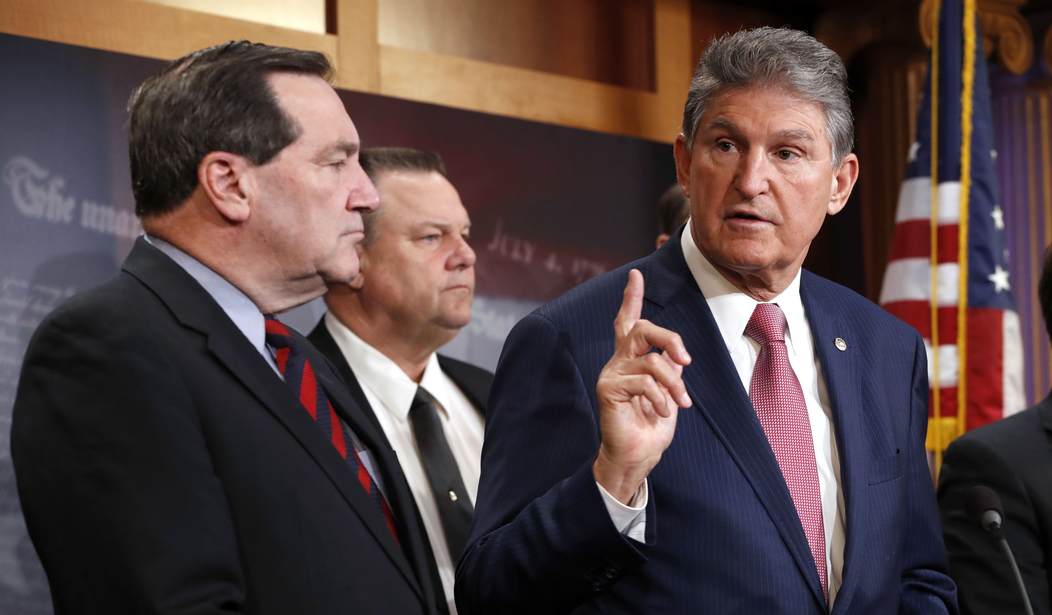It can fairly be said that most Washington politicians are not the brightest bulbs in the room. If they were, they’d be managing a hedge fund or creating an app that would make them a gazillion dollars.
That being said, even a dumb politician can wet his finger, stick it up in the air, and figure out what way the political winds are blowing. And in the case of gauging the breeze wafting toward or away from Joe Biden, vulnerable Senate Democrats have suddenly found other interests besides supporting their party leader as the fetid breeze of political defeat floats across the Potomac River.
Biden is in trouble. And that means the Democrats who serve in states that Donald Trump won or in states that are competitive for Donald Trump, are also in trouble.
Since the new Congress began in January, Senate Democrats in battleground states have broken with the president far more often on key topics. These vulnerable lawmakers, specifically those in red and purple states that Biden either lost or won by less than 10 percentage points, have voted in line with the president 28 points less frequently, on average, than they did in the previous Congress, according to an analysis from FiveThirtyEight.
Although the data set is small this early in the new Congress, the analysis offers a look at how vulnerable incumbents may be tacking to Biden’s right ahead of a critical election cycle.
Twenty-three of the 34 Senate seats up for election in 2024 are held by Democrats or independents who caucus with the Democrats. Just 10 Republican seats are being contested in 2024. And given the slew of Democrats who are vulnerable, it doesn’t appear that even moving away from Biden can save them.
Number one on the GOP hit list is West Virginia Sen. Joe Manchin. Trump won the state by nearly 40 points in 2020, and Manchin has been running away from Biden as fast as he possibly can.
The voting record of Sen. Joe Manchin (D-WV), who has yet to announce his 2024 plans, has seen the largest decrease, with the West Virginia senator only voting in line with Biden’s position 21% of the time so far this Congress, according to the data set. That’s a 67-point decline from his 87.9% voting record during the last Congress.
Manchin appears to have reached the end of his string in West Virginia. Even his legendary popularity as the most successful politician in the state’s history probably won’t save him this time around. That’s why many observers in the Mountain State think he’s going to opt for a presidential bid with the No Labels Party rather than run what promises to be a strenuous and probably losing re-election campaign.
The second most vulnerable Senate Democrat is Montana’s Jon Tester. Montana gave Trump a 16-point victory in 2020 and Tester’s chances just took a big hit when Tim Sheehy — a businessman, firefighting pilot, and former Navy SEAL — entered the race for the Senate.
“From inflation to our border to our deficit, America is ready for change. And I think it’s time for a new generation of leaders to step up,” Sheehy told Fox News Digital in an exclusive interview. “Leaders who understand servant leadership, which is putting the mission before yourself, and leaders who understand how to get results.”
Other vulnerable Democrats have also voted against Biden’s agenda in recent months. Sens. Bob Casey (D-Pa.) and Jacky Rosen (D-Nev.) “have each voted with the president about 20 points less than they did during the last Congress,” according to the Examiner.
History has shown that it’s difficult for an incumbent senator for either party to avoid being tarred by the connection to an unpopular president. But it’s not always the case that tying a candidate to a sitting president who’s unpopular works, so why not try to sneak away while they think no one is looking?
The next two elections — 2024 and 2026 — present an extraordinary opportunity for Republicans to firmly establish a GOP Senate majority that could stifle a Democratic president’s judicial picks and put a roadblock in from of radical legislation coming from the House for most of the next decade.










